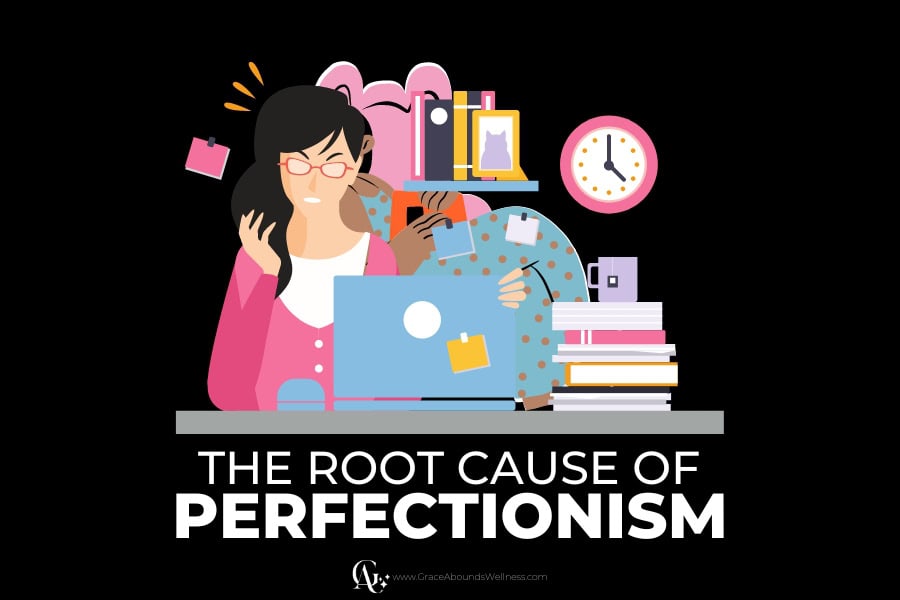What’s the Root Cause of Perfectionism | 6 Causes
This post is all about the root cause of perfectionism and why it’s crucial for us Christian women to understand how our past influences our behavior.
Heads up! This post may contain affiliate links, which means I get a small commission if you make a purchase — at no extra cost to you. I only recommend products I love and trust! Read my full disclosure here.

Have you ever wondered what the root cause of perfectionism is?
Like, why you just can’t help yourself — everything you do needs to be just right…
You neatly fold laundry in the same pattern and color-code your closet…
You organize groceries with all of the labels facing the same way…
(Or is it just me 😳?)
If you’re anything like me, you’ve been a perfectionist ever since you can remember…
It’s like our “minds are programmed” to strive for perfection.
Can I be honest with you?
It’s exhausting…
And because being a perfectionist is exhausting, I’ve been flirting with the idea that “done is better than perfect.”
So, today, we’re gonna take a deep dive into the root cause of perfectionism — why does perfectionism develop — what triggers perfectionism — and what is the perfectionist personality?
The Root Cause of Perfectionism
Do you ever feel like no matter how hard you try, you’re never quite good enough?
As a Christian, you know that in Christ, you’re enough.
But still…
You scroll through your curated social media feeds, and although you know that what you see are unrealistic expectations, negative emotions surface and you feel constant pressure to be more — to do better…
This makes it easy to fall into the trap of perfectionism.
But what if I told you that this striving for this unattainable ideal might be rooted in deeper emotional struggles?
Let’s take a look at what perfectionism is…
What is Perfectionism?
According to the American Psychological Association, perfectionism is the tendency to demand of others or of oneself an extremely high or even flawless level of performance in excess of what is required by the situation. It is associated with depression, anxiety, eating disorders, and other mental health problems.
It’s a personality trait that pushes you to achieve unrelenting high standards — often at the cost of your well-being.
Striving for excellence can lead to great achievements…
But…
The negative side of perfectionism shows up when the standards set are too high and impossible to reach. This can trigger a cycle of negative self-talk and low self-esteem, especially if you’re tying your worth to your accomplishments.
Perfectionist Personality
A perfectionist personality is more than just trying to be flawless…
It’s a deep-rooted habit that can affect almost every part of your daily life. People with this type of personality set extremely high standards for everything they do — from work to personal relationships. This constant drive for perfection often leads to self-criticism and stress.
A key feature of a perfectionist personality is how deeply it impacts their life.
For them, being perfect is essential for their self-worth and happiness. This pressure can cause them to procrastinate, avoid new experiences because of the fear of failure, and feel overwhelmed.
Over time, these issues can turn into serious mental health issues like anxiety disorders, depression, and obsessive-compulsive disorders.
People with a perfectionist personality also have a hard time with constructive criticism and being vulnerable, often seeing feedback as personal attacks. Their strict expectations can hurt their relationships, causing conflicts and misunderstandings.
To manage a perfectionist personality, it’s important to recognize and address the deep insecurities and fears driving these behaviors. Treatments like gospel-centered cognitive behavioral therapy (CBT) can help by changing irrational beliefs and promoting healthier habits — which create a more balanced outlook on perfection.
7 Ways A Perfectionist Personality Might Show Up
- At Work: You often stay late to ensure your project is beyond perfect, even when it’s already good to go.
- In School: You stress over keeping a perfect GPA and study much more than your classmates.
- Socially: You rehearse what to say before hanging out with friends and worry about what you said after you get home.
- Hobbies: Sometimes you start a fun project and then abandon it because it isn’t turning out just right.
- Your Looks: You spend a lot of time on your appearance and getting your outfit just right. You might even avoid going out if you don’t feel perfect.
- Health and Fitness: You stick to a strict diet or exercise plan and feel really bad if you deviate even slightly.
- At Home: Your place is always spotless, with everything in its exact place, and you feel stressed if things are out of order.
💖 Explore Related Posts 💖
- Self-Sabotaging Meaning, Signs, and How to Stop
- Unlocking Freedom from Comparison Culture
- How To Build Self-Worth God’s Way: 12 Simple Steps
Perfectionist Tendencies
I honestly thought being “detail-oriented” (a.k.a. an extreme perfectionist) was a sign that I cared. I even thought that being a perfectionist made me better than others 🫤.
Perfectionist tendencies is…
- re-doing a task several times to make it just right…
- hesitating to start something new unless you’re sure you can do it perfectly…
Perfectionistic behaviors aren’t just about having high standards — it’s about a deep-rooted fear of failure, often because you seek external validation.
No judgment here! Trust me, you’re not alone in this.
And the great news is that the first step to overcoming perfectionism is recognizing these tendencies.
10 Perfectionistic Tendencies
- Double-Checking Everything: You check your work multiple times to make sure it’s flawless.
- Hesitant to Let Go: You worry others won’t meet your high standards.
- Procrastinating: You hesitate to start projects, fearing they won’t be perfect.
- Fixation on Flaws: You often focus on minor flaws in your work or appearance.
- Indecisive: You struggle with the fear of making the wrong choice.
- Setting Unrealistic Goals: You set nearly impossible standards for yourself.
- Rarely Satisfied: You rarely feel proud of your achievements, always seeing room for improvement.
- Excessive List-Making: You make detailed lists for everything, planning every day thoroughly.
- Avoiding New Opportunities: You avoid new activities for fear of not excelling right away.
- Needing Constant Reassurance: You need others to confirm your choices are correct.
The Three Types of Perfectionism
- Self-Oriented Perfectionism is all about setting really high standards for yourself. It’s common among high achievers’ strong desire to excel in their efforts. But when you pair unattainable goals with negative self-talk, it can really backfire.
- Other-Oriented Perfectionism is when you expect everyone else to meet your high standards. It can strain your relationships and create a negative environment. It’s often a response based on social anxiety or your past traumatic life experiences.
- Socially Prescribed Perfectionism is when you feel like everyone expects you to be perfect. It’s really tricky because it depends a lot on what you think others think of you and the fear of judgment. Which can promote a perfectionist mindset that can worsen issues like body shaming and mental health disorders.

Download Your Printer-Friendly Guide, Reveal the Power of God’s Promises, and Begin Your Journey to Emotional Wellness
What Is the Root Cause of Perfectionism?
The root cause of perfectionism can be pretty complex, and it’s often connected to your experiences — especially during your early formative years.
Sadly, the root causes of your perfectionism may stem from believing your worth comes from what you achieve…
If you grew up being loved and praised depending on how well you did things — this might’ve unintentionally made you feel like your worth is based on being perfect — not on who you are.
- Your parents rewarded you only when you got good grades or were the best in music class.
- Parents, close relatives, boyfriends, husbands, friends, and even church family were overly critical or hurt your pride.
- People made you feel like you’re not good enough.
- You grew up in an environment where things were black or white.
- Traumatic experiences that made you feel the need to be in control.
- Your first experience of shame: body shame, intellectual shame, emotional shame…
The existential feeling that you need to meet others’ high expectations all👏the👏time can be the root cause of your perfectionism. It can really shape how you see yourself and be the driving force behind how you handle everything — from daily tasks to your personal goals.
And sadly, it might lead you to believe the tragic lie that being perfect is the only way to be accepted and loved.
Remember this…
Your value doesn’t come from being perfect or meeting high standards. You are loved just for being you — a beautiful creation designed by an incredible Father — not for what you achieve.
It’s okay to not be perfect in everything. Talking to someone about how you feel can really help, like a counselor or a trusted person in your church community. They can help you see that you’re good enough just as you are.
Signs of Perfectionism
- Chronic Self-Doubt and Dissatisfaction: Despite achievements, you may never feel good enough, often because of the negative impact of persistent self-criticism and comparison to unrealistic standards.
- Procrastination or Avoidance: Fear of failing to meet high standards can lead you to delay or avoid starting tasks. This is a common coping mechanism among perfectionists — especially those dealing with past traumas or adverse childhood experiences.
- Overwhelming Stress and Anxiety: High stress levels and symptoms of anxiety are common. The pursuit of perfection often comes with constant pressure and stressful negative thoughts, pushing your emotional safety to the edge.
- Obsessive-Compulsive Tendencies: The need for order and control can manifest in obsessive thinking or behaviors, which may be a sign of an underlying anxiety disorder or obsessive-compulsive personality disorder.
These are just a few of mine: my budget spreadsheet is arranged by the due date, it takes me 3 hours to do my nails, and the faces of the presidents on the dollar bills in my wallet are all facing forward and arranged from smallest to highest. I feel at peace when my environment is clean, neat, and meticulously organized.
I believe the cause of my perfectionism is connected to my childhood. I truly love my parents and I know they did the absolute best they could to raise me. But as a child, I spent a lot of time alone, and sometimes bad things can happen to an unattended child. Back then, the only thing I felt I could control was my own space — like my bedroom. This need to control my environment has carried over into my desire to control outcomes in my life now.
💖 Recommended Resources 💖
Check out all of the FREE Body Image Related Resources here!
What Triggers a Perfectionist?
Simple every day situations can trigger this deep-rooted perfectionism. It can be SO many different things — it really depends on your unique root cause of perfectionism.
Maybe it’s when…
- you’re asked to lead a project at work
- starting a new job
- presenting at a team meeting
- receiving feedback from colleagues or church leadership
- your academic performance isn’t where you’d like it to be
- participating in social settings
- when you’re planning a friend’s birthday party
- hosting a dinner party
…suddenly, the pressure peaks — and so does the anxiety.
You feel like everything has to be perfect, or you’ll let everyone down.
The triggers can come from any area of life and can disrupt all aspects of your life.
Is There Hope to Overcome Perfectionism?
The good news is…
YES. ABSOLUTELY. 100% THERE”S HOPE!
You have access to the throne of grace my beautiful friend — and God is able to help you get through the stressful thoughts, the pressure to perform, and the overwhelming and exhausting need to be perfect.
Next Steps
The first and most important step is to believe and understand that your worth is not defined by your accomplishments but by Whose you are — a beloved daughter of God.
This week make it a point to treat yourself with the same grace and compassion you extend to others. Think “done is better than perfect…”
- Set Realistic Goals: Start small. Set 1-2 achievable goals and celebrate when you meet them! Not because they were perfect but because you did them.
- Practice Self-Compassion: Remind yourself daily that it’s okay not to be perfect. Look at your mistakes with a growth mindset.
- Seek Support: Talk to someone — a gospel-centered cognitive behavioral therapist or a trusted spiritually mature woman.
- Renew Your Mind: Read and study God’s word. Reprogram your mind by replacing lies with Truth!
I’ll leave you with this…
Letting go of perfectionism doesn’t mean letting go of your dreams or not trying your best. It means understanding and accepting your limits, embracing your imperfections, and knowing that you are enough — just as you are.
You don’t have to carry this burden alone. Reach out, share your struggles, and let’s walk this path together!
Embrace imperfection with grace… Because in Christ, you are more than enough…
My prayer for you is that my decades of experience with — an all-consuming battle with distorted body image — and self-worth struggles — and how God has radically worked on my heart will bless and inspire you!
You’re Invited…
You have an open invitation to binge on all of my posts — written with Holy Spirit-inspired words and filled with love just for you — my beautiful friend.
If you love this content and want to be the first to know of the best in grace-first wellness, scroll to the bottom and subscribe to The Grace Abounds Collective newsletter.
Sharing is caring! Share this post with someone who needs the life-transforming grace and love of Jesus. It’s super easy! Just tap any of the share buttons — to the left on your screen.
Thank you for joining me on this journey. You are loved, precious, and wonderfully made.







Join the List
Stay up to date & receive the latest posts in your inbox.